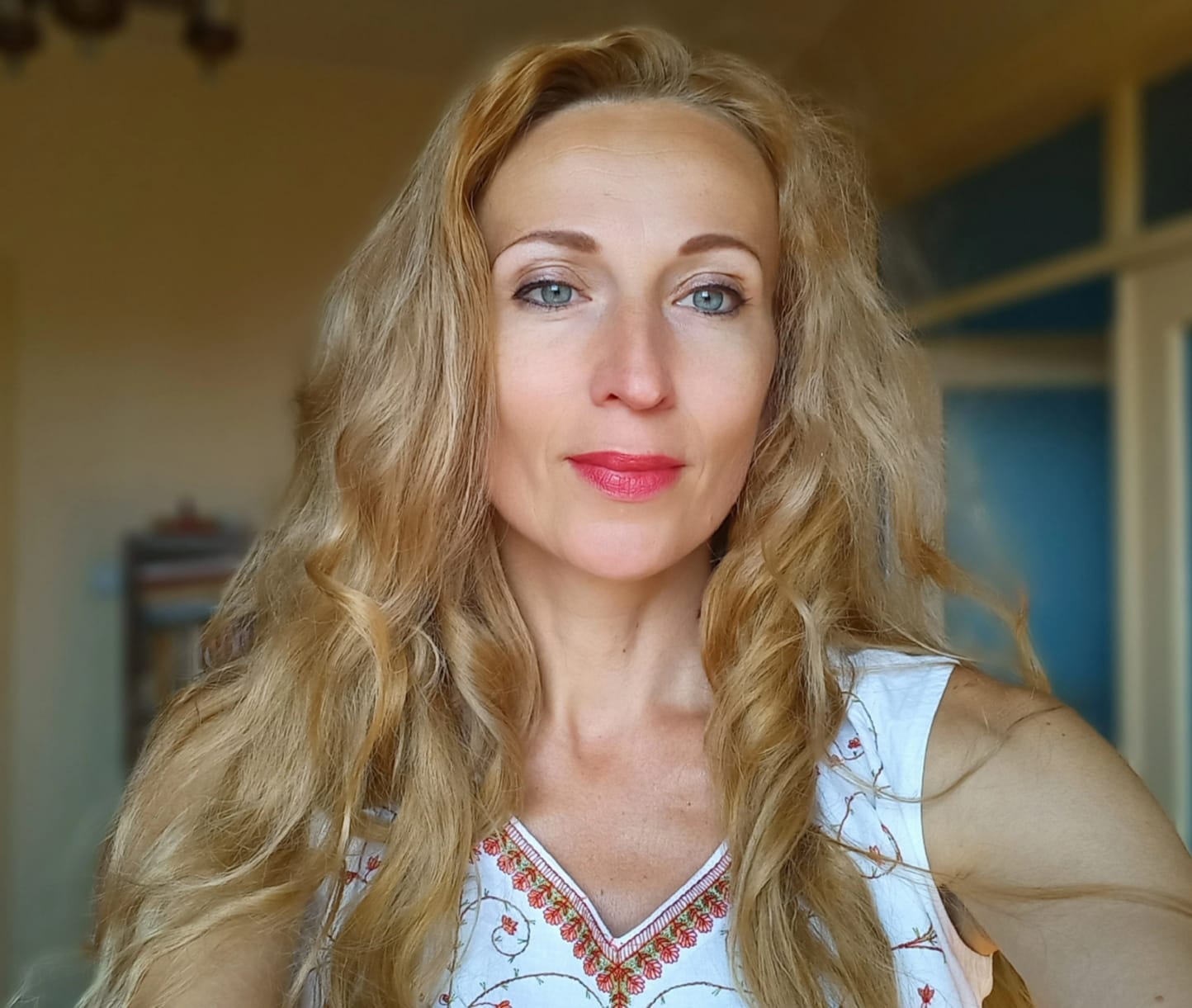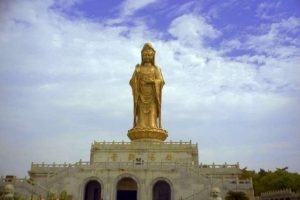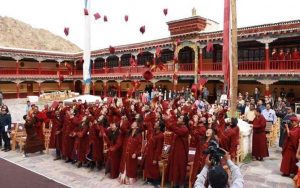
On 7–9 September, the international scientific conference “Buddhism in the Third Millennium: Trends and Prospects for Development” was held in the sacred land of Tuva. A federal subject of Russia, Tuva lies in southern Siberia, and is locally believed to be the geographical center of Asia. The Tuvan people, a Turkic ethnic group, have a unique culture and live in a world inhabited by the spirits of their ancestors, and where unspoiled nature and the ancient land are considered sacred.
When Buddhism reached the region in the 18th century, it absorbed many of the local Shamanic beliefs. Today in Tuva there are both shaman communities and Buddhist monasteries (known as khuree). Although many temples were destroyed during the Soviet period, they are now being actively rebuilt in various districts of the republic. In 2011, the chairman of the Tuvan government, Sholban Kara-ool, received blessings and instructions from His Holiness the Dalai Lama to establish a new central Buddhist temple in the capital Kyzyl, construction of which commenced in 2014. This project is just one of the many signs of a revival of Buddhism in Tuva, along with the organization of scientific forums that bring together scholars from different countries to share ideas and discuss prospects for the development of the Buddhist tradition.
The most recent of these conferences was the third scientific initiative organized under the patronage of the Dalai Lama’s honorary representative for Russia, Mongolia, and the members of the Commonwealth of Independent States (CIS), the shadjin lama (head lama) of the Kalmyk Republic, Telo Tulku Rinpoche.

The first conference, “Buddhism in a Changing World,” was held in May 2014 in Ulan Ude, capital of Buryatia, within the framework of the celebration of the 250th anniversary of the Institute of the Pandit Khambo Lama of Russia. It was organized by the Institute for Mongolian, Buddhist, and Tibetan Studies of the Siberian Branch of the Russian Academy of Sciences, and was attended by the eminent scholars Prof. Robert Thurman (US), Prof. Samdhong Rinpoche (India), and Prof. Ngawang Samten (India), as well as scholars from France, Mongolia, Poland, Russia, and Uzbekistan.
The second conference, “Buddhism in Dialogue between Eastern and Western Cultures: Past, Present and Future,” took place in September 2015 in Elista, capital of Kalmykia, within the framework of the 10th anniversary of Europe’s largest Buddhist temple, the Golden Abode of the Buddha Shakyamuni. Organized by the government of Kalmykia, the central Kalmyk Buddhist temple (the Golden Abode of the Buddha Shakyamuni), Kalmyk State University, and other cultural institutions, the conference was attended by Geshe Lhakdor, director of the Library of Tibetan Works and Archives (India), Robert Beer, a master of thangka painting, and a specialist in Tibetan and Nepalese Buddhist art (UK), and scholars from Bulgaria, Mongolia, Russia, and the US, as well as Buddhistdoor Global senior writer Raymond Lam (Hong Kong).

The third conference “Buddhism in the Third Millennium,” in Kyzyl, was organized by the Tuvan government, the Tuva Institute of Humanities and Applied Social and Economic Research, Tuvan State University, the Administration of Kamba Lama of the Republic of Tuva, the Tibetan Centre for Culture and Information in Moscow, and the Save Tibet Foundation. Scholars from Bulgaria, Kazakhstan, Mongolia, and Russia participated in three panels under the themes: Traditional and Western Buddhism in Russia: Trends for Development; Buddhism, Education, and Science; and Buddhism and Traditional Medicine.

This year’s Buddhist forum was opened at the mian building of the Government of the Republic of Tuva, with an emblematic cultural performance of Tuvan throat singing (khoomei). During the plenary session, Kara-ool welcomed the participants, noting that the process of reviving Tuva’s national culture included the revival of religious beliefs. He observed that modern social and spiritual processes had lead not only to a change in the place of religion in society, but had also affected the development of religiosity and the evolution of modern religious consciousness. Kara-ool explained that according to official data, in 1929 there were 25 khuree, 4,813 lamas, and 487 shamans in Tuva.
In 1937, there were only five khuree, 67 lamas, and 30 shamans, and by the 1940s, all Buddhist monasteries in Tuvan territory had been completely destroyed. The democratic transformation that began in the 1990s, he said, had contributed to the revival of religious institutions, and in 1990, the first Buddhist community was registered by Tuva’s ministry of justice. A year later came three more. Currently, there are 24 officially registered Buddhist organizations in Tuva. Kara-ool emphasized that the government is actively pursuing a policy of peaceful coexistence for different religious movements, advocating inter-religious and inter-ethnic harmony.
Lopsan Chamzy, kamby lama (senior lama) of the Republic of Tuva, congratulated the conference participants and expressed hope that the event would continue on an annual basis. He gave a brief outline of the main stages of the development of Buddhism in the country, with a presentation on the existing achievements and challenges facing the local Buddhist community.
Telo Tulku Rinpoche expressed gratitude to Kara-ool and to the rector of Tuvan State University, Olga Khomushku, for organizing the conference. Rinpoche defined the aim of the conference as a way of bringing scholars together to engage in open dialog, and to implement ideas for further research on how to improve Buddhism in the Russian Federation. He highlighted that although interest in the teachings of Buddha is growing among Tuvans, there remain a number of weak areas that need to be worked on: “I remember when I first came to Tuva, there were probably four or five [sangha] members, whereas today it is probably close to 100, and it is definitely improving and developing. But I always tell people that Buddhism is not just about spirituality. Buddhism is not religion alone. It also has a philosophy and also has a science of the mind. Therefore, from the perspective of philosophy and science, there are still a lot of areas that we need to work on. I think that this is one of the reasons why these conferences have been held and particularly the topic which speaks about a perspective for development.”

Rinpoche stressed that the number of Buddhist scholars in Russia has declined, noting that when he first arrived in the region in 1992, he was surprised by how many Buddhologists and Tibetologists there were and that even in the totalitarian government of the Soviet Union there were many wonderful scholars dealing with spirituality. Since the collapse of the Soviet Union, with people enjoying increased freedom of consciousness and of religion, Rinpoche observed that it would be logical to think that specialists in the field of spirituality would increase, but unfortunately this has not been the case. He offered words of encouragement to the younger generation, underlining that there are prospects for great careers in the field of Buddhism and in academia.
All images courtesy of the author.

Related
Connecting Art, Women, and Spirituality, with Lyudmila Klasanova of Sofia University (Buddhistdoor Global)














